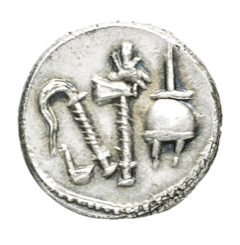| Saint-Louis University - Bruxelles | ||||||||||||||||||||||||||||||||||||||||||||||||||||||||||||||||||||||||||
|
||||||||||||||||||||||||||||||||||||||||||||||||||||||||||||||||||||||||||
|
SIHDA 2022
Ius et Religio, Droit, religions anciennes et
christianisme dans l'Antiquité
Université Saint-Louis - Bruxelles | from September 13 to 16, 2022
The Law Faculty of the Université Saint-Louis - Bruxelles is organizing the 75th session of the Société Internationale Fernand De Visscher pour l’Histoire des Droits de l’Antiquité (SIHDA).
Fernand De Visscher was a professor of Belgian Roman law, a humanist convinced of the importance of scientific exchanges between foreign scholars, to which the laws of antiquity – as the common matrix of European legal systems – lend themselves so well. Romanists and legal historians from all over the world will thus come together for this anniversary session around the theme: “Ius and Religio. Law, Ancient Religions and Christianity in Antiquity”.
The contemporary crisis of universalisms, as well as the resurgence of fundamentalisms, both religious and secular, require more than ever an informed look at “religion” in its historical and institutional relationships with law, the state, and society. By the way, what are we talking about when we use this word? And how does this look at the integration of a system of positive law, both in terms of public law and private law? Finally, what hindsight do the Romans, who invented law as an unprecedented technology for social ties in the ancient worlds, while they produced a civic form of the worship of their gods, provide us in this regard?
The conference is organized with the support of the Research Council, the International Relations Unit of the Université Saint-Louis - Bruxelles, le Centre d'histoire du droit, des Institutions et de la Société (CRHiDI), le Centre de droit privé (CePri), l'Ecole des Sciences philosophiques et religieuses (ESPR), the Comité voor Rechtsgeschiedenis Koninklijk Vlaamse Academie van België voor Wetenschappen en Kunsten, la Maison de l'Histoire Européenne, as well as the Fonds de la Recherche Scientifique (F.R.S.-FNRS).
Chosen theme : Ius and Religio. Law, Ancient Religions and Christianity in Antiquity
Cicero already observed that the rites of a people's religion determined its social and political institutions. What conception of social bonding can a people have that practices human sacrifice? What notion of 'good faith' (fides) or 'piety' (pietas) can they have? (Pro Fonteio 13). This rhetorical question of the great philosopher deserves to be pursued and radicalised: what relationship is there, or is there not, between the worship of the gods of the Romans, who produced a form of civic organisation, renouncing in particular human sacrifice in a way that they considered decisive for the difference between civilisation and barbarism, and the system of law of which they were the 'inventors'? Are institutional evolutions observable when the rites of the cult of the gods are transformed? What can we deduce from the mutation of the substitutionary sacrifice of the ancients into a sacrament by the Catholic Church? The Catholic Church did not come from nowhere, nor did it remain a monolithic block in the course of its subsequent history, so the question needs to be developed at the different levels of Hebraic, Roman, Catholic, and finally Lutheran articulation, where again this central act of worship underwent a decisive evolution.
From the pontifex maximus of the ancient priestly college, from which law emerges as a new technology of the social bond in the ancient worlds, to the Supreme Pontificate of the Bishop of Rome, fascinating issues are open to the gaze of the Romanist and the Legal Historian: these issues include not only the reciprocal influence of the lex Christiana and the lex Romana on the institutions of private law or criminal law, which would benefit from being updated, or the advent of Canon law, a sui generis law based on Roman law, but also more crucial questions about the 'abstract shaping' of societies: personality? universality? secularity? freedom, especially religious freedom? the "autonomy of the will"? liability "for any human behaviour"? relevance of tradition? relevance of reason and truth? natural law? etc.
Steering Commitee
Paul DU PLESSIS (University of Edimbourg) Patricio CARVAJAL (Pontifica Universidad Catolica de Chile) Annette RUELLE (Université Saint-Louis - Bruxelles)
Documents
*Denier de César, 49 av. J.-C. : Les instruments pontificaux RRC 443/1 [revers] © gallica.bnf.fr |
|||||||||||||||||||||||||||||||||||||||||||||||||||||||||||||||||||||||||


